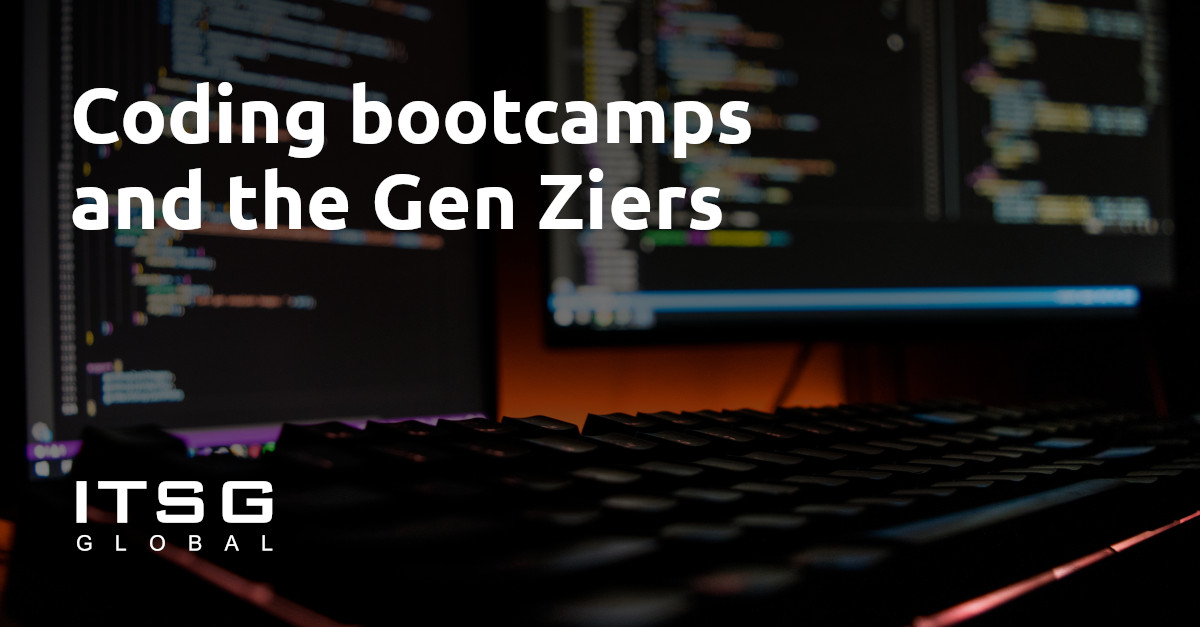11 October 2021
Long gone are the times when becoming a software engineer required enrolling in a four-year long education programme. Bootcamps were the game changers when it came to providing necessary skills for eager Gen Ziers, ready to enter the market and perform their job just fine without the costly and time consuming degree.
HOW TO LEARN NEW SKILLS
According to HackerRank’s 2020 Developer Skills Report C is the language that is the most popular to learn as a first one for both Millennials and Gen Z. With other languages there are some small differences and so – Millennials were more prone to choose Java while Gen Ziers preferred C++ as their first language. Over 70% of Gen Ziers said that they use YouTube and websites like GitHub to obtain new skills. What is interesting is that over 45% of asked Millennials, Gen Xiers and Baby Boomers said they were learning on the job from more experienced colleagues, while only 37% of Ziers use that possibility and it’s their second less favourable option to learn right after bootcamps.
Still however, they use bootcamps to learn new skills more often than any other generation before (according to HackerRank’s questionnaire).
SO, HOW FAR WILL THE DEGREE TAKE YOU?
Currently, nearly 1 in 3 managers has hired at least one bootcamp grad and that statistic was similar across all company sizes. At the same time, nearly 20% of managers weren’t sure whether they had hired a bootcamp grad or not. As the questionnaire continued it was found out that almost 40% of managers who had hired a bootcamp grad believed they are just as well equipped for the job as other hires, while 33% said they were better, mostly because of their capability to learn quickly and their practical experience.
In big companies with over 10 000 employees more than 90% of developers have at least a Bachelor’s degree. In small companies (under 50 employees) it’s only 70%. But it’s the language that matters the most – developers who know Perl statistically make 54% more than their peers, with Scala and Go being other languages associated with salary increase.
Apparently the degree isn’t THAT relevant. And another thing is – do Gen Ziers even WANT to work for the big players?
Turns out – not necessarily. In interviews with Gen Z developers it was specifically said that some of them do not want to perform the same small task over and over again, but preferably be the part of the whole process instead of “climbing the ladder” to finally be awarded with the possibility to do the job they were originally interested in.
GEN Z WOMEN
Apparently nearly 30% of women from the Gen Z generation learned to code before they were 16, compared with 18% of women from previous generations as the 2019 HackerRank report shows. According to the same report half of female developers know JavaScript and majority knows Java and Python. It looks like Gen Z women have generally the same competences as their male peers with one difference being proficiency in Java (72% of women) compared to 66% of men from the same generation. Since diversity and equal opportunities continue to be hot topics in the industry, it is expected that the number of female software developers will increase.
Especially if we take into consideration how many coding bootcamps or scholarships are dedicated to women in the first place.
QUESTIONS (NOT ONLY) FOR THE FUTURE
The question remains, if a non-engineer can learn how to code in just a few months, how quickly will the process be fully automated? The assumption is that the act of actually writing a code is less important than solving a problem, considering the security issues and figuring out how to present the solution to the final user of the product. In the end the ability to create a simple Android app doesn’t make anyone an attractive future employee. Especially with most software ideas already being developed by many specialists before.
Coding bootcamps might be a good starting point for many, but only if the participants are willing to put their time and effort in the process. Generally, coding bootcamps are not accredited in any way which means they provide practical skills, however they are basically useless from an academic perspective. Which means grads will be able to perform tasks, but probably without any deep knowledge of how their software actually works.
Nevertheless to stay ahead of the curve it might be a good idea to learn basic coding and then focus on actual computer science, which probably will be quite a lot about mathematics. In the end, if your job can be done by a ton of evenly qualified people, some of them willing to work for a percentage of an average wage in developed countries, then thinking about one’s own job prospects one has to bring more to the table.
Author: Leszek Warzecha, Digital Marketing Specialist at ITSG Global







